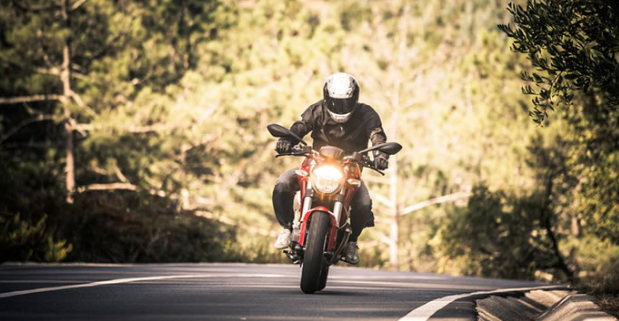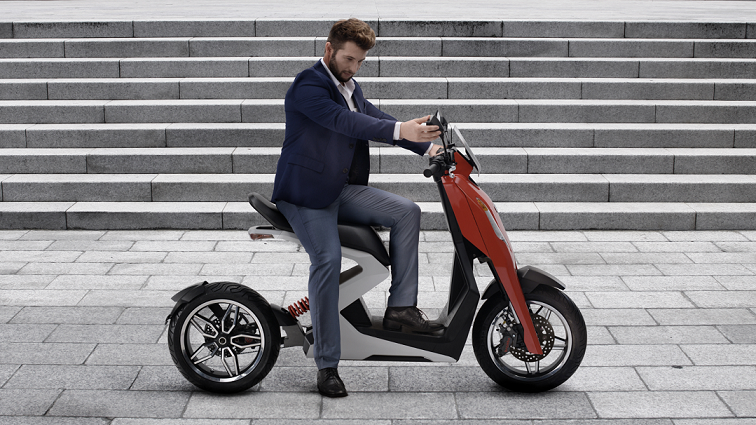A Complete Guide to Motorcycle Tax

As a responsible motorbike owner or learner, motorcycle tax will be part of the upkeep process. It isn’t the most thrilling aspect of owning a bike, but it is important.
In this guide, we’ll give you a rundown on everything you need to know about motorbike taxes.
What is motorcycle road tax?
Every motorcycle owner has to pay road tax, which is also known as Vehicle Excise Duty (VED). It has been a part of the lives of UK motorists for over 100 years, thanks to the Roads and Finance Act 1920, which was implemented in 1921 to finance the upkeep of Britain’s roads.
Whether you have a classic or electric motorbike, you’ll have to pay this tax, which you can do at your local post office or by phoning the DVLA. For convenience, you can also pay it via the Government’s website.
How much is road tax on a motorbike?
The road tax for Class 1 (up to 200cc) and Class 2 motorcycles (over 200cc) is based on engine capacity (scooters also fit into this TC17 category). All motorcycles must be registered for road tax, even if the tax rate for a particular bike is zero.
A single 12-month payment is charged the same, whether you pay by direct debit or in person at a Post Office. A six-month payment, however, is higher if it’s paid at the Post Office. The table below shows the prices when paid by direct debit.
ENGINE SIZE (CC)
SINGLE
12-MONTH PAYMENT
12 MONTHS BY INSTALMENT
(TOTAL)
SINGLE
SIX-MONTH
PAYMENT
150 and under
£25.00
£26.25
N/A
151 to 400
£55.00
£57.75
£30.25
401 to 600
£84.00
£88.20
£46.20
600 and over
£117.00
£122.85
£64.35
How much does it cost to tax a moped or scooter?
A moped’s engine capacity is under 150cc, therefore the cost of road tax is £25 for the year. Scooters, though, vary in engine size. Some scooters are just 50cc, but others have engines of more than 600cc. The road tax depends solely on engine size.
How to tax a motorbike

When you tax your motorcycle, you’ll need:
Your most recent reminder (V11, given approximately three weeks before your motorcycle tax expires by the DVLA)
Your registration document (also known as a V5C, green slip, or logbook), or a V5C/2 (new keeper slip) – it must be in your name
A valid MOT certificate
Motorbike insurance
Paying motorbike tax online
To pay your motorcycle road tax online, you’ll need the documents listed above, plus your debit/credit card. There are three payment options:
Single payment for 12 months’ tax
12 monthly instalments for 12 months’ tax
Single payment for six months’ tax
Six months by direct debit
Taxing your bike by phone
There’s a 24-hour telephone service for road tax, however, you cannot pay by Direct Debit over the phone. To pay over the phone, ring 0300 123 4321.
Tax your bike at the Post Office
Alternatively, you can tax your motorbike at a Post Office branch that deals with road tax.
Payment can be made by debit/credit card, cheque or cash, and if you’d like to pay in monthly instalments, you can set up a direct debit at your chosen branch.
Make sure you have the relevant paperwork (listed above) and your bank/building society details for a direct debit set-up.
Tax exemptions for motorbikes
Every motorcycle must be registered for road tax, even if there is nothing to pay. There are three main reasons for being exempt from motorcycle tax:
Your motorbike is powered by electricity
You are registered as disabled
Your bike is a historic vehicle
What year is tax-exempt for motorcycles?
There’s a 40-year+ rolling exemption for historic vehicles. If your motorcycle was first registered before 1 January 1984, it’s not liable for vehicle excise duty. However, if your classic bike is used for commercial purposes, it can’t be taxed in the historic class.
Do you have to pay tax for an electric motorcycle?

Currently, it’s free but remember that your historic motorcycle or electric motorbike must be taxed – even if you don’t have to pay. The same applies if you are eligible for road tax exemption due to disability.
From the 1st of April 2025, electric motorcycle (and scooter) owners will have to pay road tax (Vehicle Excise Duty).
Do you have to pay road tax if you’re disabled?
You may be eligible for road tax exemption for your motorbike if you receive one of these benefits:
Higher rate mobility component of Disability Living Allowance
Enhanced rate mobility component of Personal Independence Payment
Armed Forces Independence Payment
War Pensioners’ Mobility Supplement
What happens to the road tax if you sell your motorcycle?
When you sell your motorcycle, the DVLA must be informed of new ownership. This can be done online or by sending your V5C to the DVLA in Swansea, SA99 1BA.
Your notification will automatically trigger a VED refund for every complete month remaining on your road tax, from the time the V5C is received or the online submission is made. A direct debit will be stopped immediately.
When you buy a used bike, of course, the same applies. Unused tax will be refunded to the previous owner, so at the point of sale, your motorcycle will be untaxed.
Using the 12-digit number on your V5C/2, you can tax your motorbike online, by phone or at the Post Office. Make sure that the bike has a valid MOT certificate.
If your bike is on the road without tax, you could be fined up to £1,000.
What happens to the road tax if your motorbike is an insurance write-off?
If your insurance company declares your bike a write-off, you are, in effect, selling your bike to the insurance company, and any unused tax will be refunded to you.
Again, you can provide notification online or by post. In either case, you will have to put your insurance company’s name and postcode into the ‘Provide trader details’ section.

What happens to the road tax if you scrap your motorcycle?
When you inform the DVLA that you’ve scrapped your motorbike, you’ll receive a refund for each complete month of tax that you’ve paid. The only legal way to dispose of a motorcycle is at an authorised treatment facility (ATF).
This will also happen if you take your vehicle off the road and complete a SORN (Statutory Off Road Notice).
Do you need insurance to tax a motorbike?
Similar to motorbike taxes, insurance for your bike may not seem exciting, but it is essential and required to actually tax your motorcycle. Bikesure can make it simple with our selection of motorbike insurance schemes to pick from.
Call 0800 369 8580 for a quick and easy quote or book a callback at a time that suits you.






